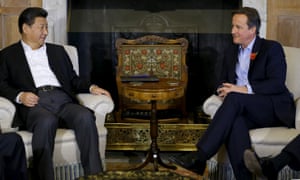Prime minister wants to know state will remain semi-autonomous, but little is revealed about talks on human rights
David Cameron sought assurances from the Chinese president, Xi Jinping, about political freedom in the former UK colony of Hong Kong, as the week-long festival of closer Sino-British co-operation neared its end.
Cameron and the Chinese president spent the afternoon at the prime minister’s country retreat, Chequers, discussing foreign policy issues including Hong Kongand Syria, part of a visit that the Conservative government believes has put British-Chinese relations on an entirely new and more intimate footing.
The president will end his state visit in Manchester on Friday, with a visit to Manchester City football club and a meeting with northern-based businessmen.
Cameron was seeking assurances that theHong Kong government would remain semi-autonomous and entitled to choose its own leadership without prior vetting by the Chinese government.
The prime minister was also expected to question the Chinese over their approach to Syria, including whether they would continue to veto UN support for tougher military action against Isis.
Following the talks, Number 10 said: “The prime minister cited the Iranian nuclear dealas one example of where the UK and China working together can bring about real results.
“They discussed the importance of finding a solution to the Syrian conflict, agreeing the international community must come together more effectively to tackle the evil of Isil [Isis].”
Before a dinner with their wives, Samantha Cameron and Peng Liyuan, the two leaders visited the Plough at Cadsden near Chequers for a beer. Cameron, who was wearing a red poppy even though the poppy is seen in China as an offensive symbol of the 19th-century opium wars, recalled that the Plough was the pub in which he onceinadvertently left his daughter Nancy.
In their joint statement, the two leaders agreed they had opened a “golden era” in UK-China relations, with the countries committing to build “a global comprehensive strategic partnership for the 21st century”.
The statement made only the most tangential reference to human rights, focusing on the closer business, financial and educational kinks forged during the visit. The 1,500-word joint statement contained a pledge to “enhance bilateral trade and investment”, deepen the “unparalleled” partnership between their financial services sectors and cooperate on major initiatives, including Britain’s national infrastructure plan and northern powerhouse, and China’s One Belt, One Road project to improve transport links with Europe.
The document also stated that the UK “welcomes the progressive participation of Chinese companies in its civil nuclear energy projects”, and that both sides encourage their nation’s countries to “deepen cooperation and participation in high-speed rail”.
It also promised to refrain from cyber-espionage and to liberalise visa regimes and called for the swift launch of a feasibility study for a China-EU free trade agreement.
The statement was virtually silent on human rights, noting only that the two sides “will further enhance political trust based on equality and mutual respect, and in that spirit recognise the importance each side attaches to its own political system, development path, core interests and major concerns”.
In an emergency statement granted by the Speaker, John Bercow, MPs demanded to know whether Cameron was using the visit to raise specific concerns about China’s records on human rights, including the detention of lawyer Zhang Kai and other rights defenders. He faces the risk of detention for 15 years, and he is one of nearly 300 lawyers and human rights defenders who have been detained since July this year.
The Conservative backbencher Fiona Bruce urged ministers to place dialogue on human rights, freedom of thought, speech and assembly and rule of law “at the centre of this relationship”.
The former Tory minister Tim Loughton questioned why pro-Tibet and free speech protesters had been “corralled” behind barriers, while Chinese “cheerleaders” were given prime position to watch Xi being driven up the Mall to meet the Queen.
Loughton asked: “Why, in the UK where our democracy is built on the principle of free speech, were protesters in the Mall this week exercising their right to draw attention to human rights abuses in Tibet corralled behind barricades at the back while Chinese state-sponsored cheerleaders were given Love China T-shirts and Chinese diplomatic bags and given prime position at the front?”
Another Tory backbencher, Sir Edward Leigh, said: “The house does not want vague assurances from the minister; we want to know that, while we respect the world’s growing superpower and want to trade with it, we are absolutely fearless in these matters and that during this visit our leadership will raise these matters with the Chinese president.”
The Foreign Office minister Hugo Swire agreed that some human rights violations were deeply worrying, but refused to disclose what specific human rights issues were being raised.
In the final round of announcements on Friday, the two governments will reveal that Hainan Airlines will start the first direct flights from Manchester airport to China – the first in the UK outside London. The deal is estimated to provide a £50m boost to the Manchester economy and open up links from China into the northern powerhouse.
In addition, Beijing Construction and Engineering Group has been appointed as the main contractor for the Middlewood Locks regeneration project in Manchester. It will also provide £4m development financing to help kickstart the project.
On their tour of the city, the prime minister and president will visit Manchester City football academy. Here, they will see a training match taking place and meet players past and present from Manchester City and Manchester United including Gary Neville, Patrick Vieira, Denis Law and Mike Summerbee.
http://www.theguardian.com/politics/2015/oct/22/xi-jinping-state-visit-hong-kong-freedom
